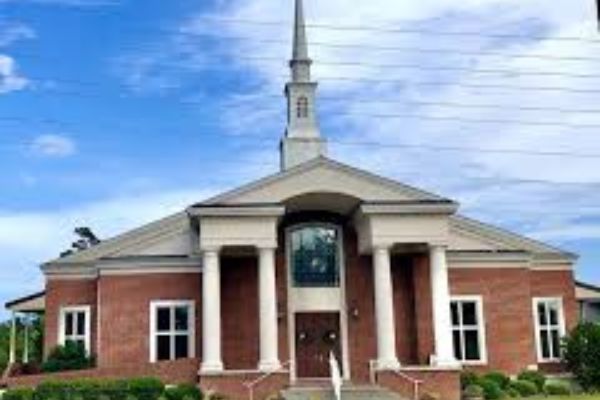Building a new church or renovating an existing one can be a significant milestone for any congregation. However, the costs associated with construction, expansion, or renovation can be substantial, making church building loans an essential financial resource for many religious organizations. Church building loans are specialized financing solutions designed to support churches in constructing new buildings or improving existing facilities. This guide explores various aspects of church building loans, their benefits, requirements, and how to choose the right lender.
Church Building Loans
A church is more than just a physical structure; it serves as the heart of a community, providing a place for worship, fellowship, and outreach. However, whether building a new facility from the ground up or expanding an existing one, the financial challenges can be daunting. This is where church building loans come in handy.
Church building loans are specifically designed to assist religious institutions in financing construction projects, whether it be a new building, renovations, or expansions. These loans are tailored to meet the unique needs of churches, considering factors such as irregular cash flow from tithes, donations, and other church income streams.
Types of Church Building Loans
Understanding the different types of church building loans available is crucial to choosing the right financing option for your congregation’s needs. Here are the primary types:
a. Construction Loans
Construction loans give churches the funds they need to build a new facility. These loans are typically short-term and cover the cost of building materials, labor, and other construction-related expenses. Once construction is complete, the loan is often converted into a long-term mortgage.
b. Renovation Loans
For churches that already own a building but need to update, expand, or repair the existing structure, renovation loans are a great option. These loans are specifically designed to finance improvements to an existing facility, such as upgrading HVAC systems, expanding seating capacity, or adding classrooms.
c. Mortgage Loans
A church mortgage loan is ideal for congregations looking to purchase an existing property. These loans function similarly to a residential mortgage, allowing churches to spread the cost of purchasing the building over an extended period.
d. Refinancing Loans
If your church already has an existing loan with unfavorable terms, refinancing can be a valuable option. A refinancing loan allows churches to renegotiate their loan terms to secure a lower interest rate or more favorable repayment schedule, reducing the financial burden.
e. Equipment Financing
Churches also often need to purchase equipment for their building, such as sound systems, musical instruments, or office furniture. Equipment financing loans help churches acquire the necessary tools to enhance their services without the need for upfront capital.
How Church Building Loans Work
Church building loans function similarly to other types of commercial loans but with a few key differences tailored to religious organizations. Here’s how they typically work:
a. Loan Application Process
The loan application process for a church building loan involves gathering financial documents, preparing a budget, and submitting a detailed plan outlining the purpose of the loan. Churches need to show a strong financial standing and the ability to repay the loan based on future income projections from tithes, donations, and other sources.
b. Loan Terms and Conditions
The terms of church building loans can vary significantly depending on the lender, loan amount, and the church’s creditworthiness. Loan terms typically range from 10 to 30 years, with fixed or variable interest rates. Some lenders offer flexible repayment options tailored to the unique cash flow patterns of churches.
c. Interest Rates
Interest rates for church building loans are generally competitive but can depend on the church’s financial health, the size of the loan, and the length of the repayment period. Churches with strong financial histories and creditworthiness may qualify for lower interest rates.
d. Collateral
Lenders often require churches to provide collateral when applying for a building loan. This collateral may include existing church property or other valuable assets. Some lenders also take into account the future value of the completed project as collateral.
Factors to Consider When Applying for a Church Building Loan
When considering a church building loan, it’s essential to assess the specific needs of your church and weigh the potential benefits and challenges. Below are critical factors to consider:
a. The Church’s Financial Health
Before applying for a loan, it’s crucial to evaluate the church’s current financial standing. Lenders will look at the church’s financial records, including tithes, offerings, and any other sources of revenue. A strong financial position increases the likelihood of securing a loan with favorable terms.
b. Loan Amount
Churches should carefully calculate the total amount of money required for the building project, including construction costs, permits, and any potential overruns. Borrowing too little could leave the church in financial trouble mid-project, while borrowing too much could lead to higher interest payments.
c. Repayment Plan
Churches must have a realistic repayment plan in place. The repayment schedule should align with the church’s expected income from tithes and donations, as well as other revenue streams.
d. Lender’s Reputation
Choosing a reputable lender is vital. Look for lenders experienced in working with religious institutions, as they will better understand the unique financial dynamics of churches.
e. Loan Term Length
The length of the loan term can significantly impact monthly payments and the total interest paid over time. Longer-term loans generally have lower monthly payments but accumulate more interest.
5. Steps to Secure a Church Building Loan
Securing a church building loan involves several steps. By following these steps, churches can increase their chances of obtaining the right financing:
a. Assess Financial Needs
Start by determining the total cost of the building project, including construction materials, labor, permits, and any additional expenses such as furniture and technology.
b. Prepare Financial Documents
Gather all financial records, including the church’s income statements, balance sheets, tax returns, and any previous loan agreements. These documents will be required during the loan application process.
c. Create a Building Plan
A comprehensive building plan is crucial. This plan should detail the scope of the project, the timeline, and the expected costs. Lenders will want to review this plan to assess the feasibility of the project.
d. Research Lenders
Research different lenders to find one that offers church building loans with favorable terms. Look for lenders with experience working with religious institutions and compare interest rates, loan terms, and repayment options.
e. Submit the Loan Application
Once you’ve gathered all the necessary documents and completed your research, submit your loan application. Be prepared for the lender to request additional information or clarification on certain aspects of your financial records or building plan.
f. Close the Loan
If approved, the lender will finalize the loan agreement, and your church can begin construction or renovation. Be sure to review all terms carefully before signing the loan agreement.
Top Lenders Offering Church Building Loans
Several lenders specialize in providing financing for churches. These lenders understand the unique needs of religious institutions and offer tailored loan products. Some of the top lenders include:
- Griffin Capital Funding: Specializes in church loans with flexible terms.
- Christian Community Credit Union: Offers competitive interest rates and personalized service.
- Thrivent Financial: Provides a variety of financial services, including church building loans.
- Bank of the West: Known for working with nonprofits and religious organizations.
- Evangelical Christian Credit Union: Offers a range of church financing options.
7. Church Building Loan Success Stories
Many churches have successfully used building loans to expand and improve their facilities, ultimately leading to the growth of their congregation. Here are a few examples:
- First Baptist Church in Texas secured a renovation loan to expand their sanctuary and add educational facilities, allowing them to accommodate a growing congregation and increase outreach programs.
- New Hope Christian Church in California used a construction loan to build a new worship center, which helped them grow their membership and increase community involvement.
- Grace United Methodist Church refinanced their existing mortgage to secure a lower interest rate, saving thousands of dollars in interest payments over the life of the loan.
Conclusion
Church building loans are a critical financial resource for congregations looking to expand, renovate, or construct new facilities. Whether the church is seeking to improve its current building, accommodate a growing congregation, or embark on a new construction project, securing the right loan can make these ambitious goals a reality. By carefully assessing their financial needs, preparing essential documentation, researching potential lenders, and understanding the different loan options available, churches can successfully navigate the loan process. Furthermore, selecting a reputable lender with experience in religious financing will ensure that the church receives the best possible terms and support throughout the building project.
In addition to choosing the right loan, it’s crucial for churches to have a clear repayment plan and to maintain strong financial records. With careful planning and the right financial partners, church building projects can become a powerful tool for growth, ministry, and outreach in the community. For congregations considering a building loan, it’s also helpful to learn from the experiences of other churches that have successfully secured financing and completed their projects. By leveraging the right resources and support, churches can ensure that their building projects not only meet current needs but also position them for future growth and success.
This guide provides an overview of church building loans, their types, benefits, and the steps involved in securing financing. From initial planning to selecting the right lender, understanding these key elements can help any church make informed decisions and achieve its construction or renovation goals. Whether building a new sanctuary, expanding seating, or upgrading facilities, a well-structured church building loan can provide the financial support needed to turn those dreams
Frequently Asked Questions
1. What is a church building loan?
A church building loan is a type of loan specifically designed to help religious organizations finance the construction, renovation, or expansion of church facilities.
2. How long does it take to get approved for a church building loan?
The approval process can take anywhere from a few weeks to several months, depending on the complexity of the project and the lender’s requirements.
3. What documents are needed to apply for a church building loan?
Churches typically need to provide financial statements, tax returns, a building plan, and details on the church’s income sources (e.g., tithes and donations).
4. Can churches with limited income still qualify for a building loan?
Yes, but lenders will carefully review the church’s financial situation and may offer loans with stricter terms or higher interest rates.
5. What is the typical loan term for a church building loan?
Loan terms can range from 10 to 30 years, depending on the lender and the size of the loan.
6. Are church building loans secured or unsecured?
Most church building loans are secured, meaning the church must provide collateral, such as existing property, to back the loan.
7. Can a church refinance an existing loan to get better terms?
Yes, churches can refinance an existing loan to secure more favorable terms, such as a lower interest rate or extended repayment period. This can help reduce monthly payments and overall interest costs, freeing up resources for other ministry activities.
8. What is the interest rate for church building loans?
Interest rates for church building loans vary depending on the lender, the loan amount, and the church’s financial situation. Typically, rates can range from 4% to 10%, but churches with strong financials may qualify for lower rates.
9. Are there any government programs that offer church building loans?
While there are no direct federal government programs offering church building loans, some local governments or nonprofit organizations may provide grants or low-interest loans for community-related projects. Churches can also explore options with faith-based lenders and credit unions that cater specifically to religious organizations.
10. What happens if a church is unable to repay its building loan?
If a church is unable to meet its loan obligations, it risks foreclosure, meaning the lender could take ownership of the property used as collateral. In such cases, the church must communicate with the lender and explore options like loan restructuring or renegotiating payment terms to avoid default.
11. Can a church get a loan for purchasing land?
Yes, many lenders offer loans specifically for purchasing land where the church plans to build in the future. This type of loan can cover both the cost of the land and future construction costs, sometimes requiring a phased disbursement of funds based on project progress.
12. Do all lenders require collateral for church building loans?
Most church building loans are secured, meaning the church must provide collateral, such as existing property or land. However, some lenders may offer unsecured loans, though they typically come with higher interest rates and more stringent repayment terms.
13. Can small churches qualify for building loans?
Yes, small churches can qualify for building loans, although they may face stricter lending criteria, such as higher interest rates or a larger down payment requirement. Lenders will closely evaluate the church’s income, growth potential, and financial management to determine eligibility.
14. Are there special loans for energy-efficient or green church buildings?
Yes, some lenders and government programs offer special loans or grants for energy-efficient construction, known as “green loans.” These can be a great option for churches looking to lower their environmental impact and reduce long-term operating costs through energy savings.
15. How can a church improve its chances of getting a building loan?
To improve the chances of securing a loan, a church should have:
- Clear financial records.
- A well-prepared building plan.
- A strong history of consistent income from tithes, offerings, and other revenue streams.
- Good credit history or any existing loans in good standing.
16. What is the typical down payment requirement for a church building loan?
Down payments for church building loans typically range from 10% to 20% of the total loan amount, although this may vary based on the lender and the church’s financial health. Some lenders may allow the value of owned land to count toward the down payment requirement.
17. What fees are associated with church building loans?
Common fees for church building loans include application fees, origination fees, appraisal fees, and closing costs. It is important for churches to ask about these fees upfront and factor them into the total cost of borrowing.
18. Can churches get a fixed or variable interest rate loan?
Churches can choose between fixed and variable interest rate loans depending on their financial situation and risk tolerance. Fixed rates remain the same throughout the life of the loan, while variable rates may fluctuate based on market conditions.
19. What should a church look for in a lender?
When choosing a lender, churches should consider:
- Experience working with religious organizations.
- Flexible loan terms and repayment options.
- Competitive interest rates.
- Customer support and willingness to assist throughout the loan process.







Leave a Comment